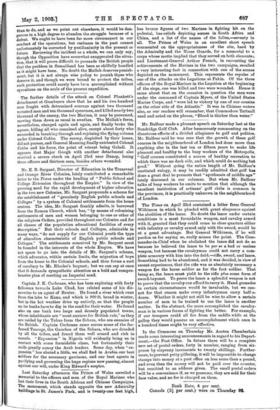The Times on April 23rd contained a letter from General
Wilkinson in which he pleaded with great eloquence against the abolition of the lance. No doubt the lance under certain conditions is a most formidable weapon, and cavalry armed with it, granted that they could come to close quarters either with infantry or cavalry armed only with the sword, would be at a great advantage. But General Wilkinson, if ho will pardon us for saying so, really misses the point. The Com- mander-in-Chief when he abolished the lance did not do so because he believed the lance to he per as a bad or useless weapon, but because the cavalryman could not carry a com- plete armoury with him into the field,—rifle, sword, and lance. Something had to be abandoned, and it was decided, in view of recent experiences, that the rifle was as absolutely necessary a weapon for the horse soldier as for the foot soldier. That being so, the lance must yield to the rifle plus some form of sword-bayonet. To prove the lance a splendid weapon is not to prove that the cavalry can afford to carry it. Hand grenades in certain circumstances would be invaluable, but we can- not for that reason make every infantryman carry half-a- dozen. Whether it might not still be wise to allow a certain number of men to be trained to use the lance is another matter. In the abstract, the more accomplished the cavalry- man is in various forms of fighting the better. For example, if our troopers could all fire from the saddle while at the gallop they would possess an accomplishment which once in a hundred times might be very effective.










































 Previous page
Previous page